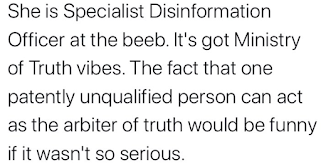 |
| A recent selfie, posted on Twitter |
Since when did expressing a negative opinion of a BBC reporter become an abusive, threatening "false claim"?
I ask this in connection to Marianna Spring, the BBC's high-profile specialist disinformation reporter - someone who specialises in "false claims".
By her own account, she's received many horrible, abusive, threatening responses as a result of her work, including death threats - something that's absolutely unforgivable, and I hope the police track down and prosecute every single person who has ever sent her anything threatening.
She's blurring things now though, and this needs pointing out.
She tweeted this screengrab today:
She then tweeted the following complaint:
I am often targeted with false claims like these.
I’m the BBC’s Specialist reporter who investigates and covers the real world impact of online disinformation.
They often focus on my gender and age. I am young and female. That makes me no less qualified to report on this.
I work with a top team of experts and editors on this beat.
It’s a beat which is increasingly important - and news outlets across the world have dedicated journalists and teams covering it.
I love my job! But want to call out this falsehood that is often shared online.
Threats and abuse I receive are usually much more extreme than this - and that should never be normalised.
That description, however, isn't a "false claim". It's someone's opinion of her and her reporting.
It's not a threat. It's not abuse. It's not extreme. It may be wrong (and certainly isn't flattering or kind), but 'some people would say' it has a few grains of truth to it - grains of truth she might do well to take onboard as a BBC journalist who is meant to be open to public feedback, including reasonable criticism:
1. She is the BBC's specialist disinformation reporter.
2. That job description - and the unit she works for - does have an Orwellian "vibe" to it - especially if you know your 1984 and know the name of the corporation that was a key inspiration for Orwell's Ministry of Truth.
3. It's surely understandable that people might ask: What qualifications does she have to speak with such authority on vaccines, pandemics, electoral fraud and the like, and how does she know which experts to turn to for advise? Her degree is in foreign languages and her short post-university career entirely involved working for various media outlets, especially the Guardian and the BBC?
4. Given that her qualifications don't seem to especially qualify her to talk with great authority on pandemics, vaccines, US election fraud, etc, it might well be considered "funny if it wasn't so serious" that she's been appointed "the arbiter of truth" on such issues at the BBC. Such a point of view is a matter of opinion of the kind that people, probably as part of being human beings, make about other people every single day. Why is it necessarily wrong to make it?
(P.S. Whatever happened to BBC journalists going out of their way NOT to be the story?)
Seriously, is even this post 'abusive'?
(This blog isn't a safe space for BBC journalists I'm afraid.)
(And Goodness knows how abused Mark Easton must feel by now, and he's neither young nor female!)

No comments:
Post a Comment
Note: only a member of this blog may post a comment.